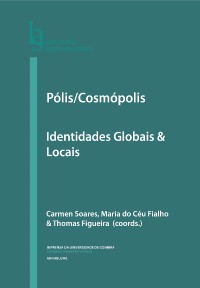Please use this identifier to cite or link to this item:
https://hdl.handle.net/10316.2/40203| DC Field | Value | Language |
|---|---|---|
| dc.contributor.author | Soares, Carmen, ed. lit. | por |
| dc.contributor.author | Fialho, Maria do Céu, ed. lit. | por |
| dc.contributor.author | Figueira, Thomas, ed. lit. | por |
| dc.date.accessioned | 2016-12-07T11:14:10Z | |
| dc.date.accessioned | 2020-03-15T20:38:46Z | - |
| dc.date.available | 2016-12-07T11:14:10Z | |
| dc.date.available | 2020-03-15T20:38:46Z | - |
| dc.date.issued | 2016 | - |
| dc.identifier.isbn | 978-989-26-1279-9 | por |
| dc.identifier.isbn | 978-989-26-1280-5 (PDF) | por |
| dc.identifier.uri | https://hdl.handle.net/10316.2/40203 | por |
| dc.description.abstract | Polis/Cosmopolis publishes the results of research, arising from diverse perspectives, into the coexistence, in tension or in harmony, of regional and global identities, minorities, and majorities in the Graeco-Roman world, in the Middle Ages, and in the Renaissance. This work will explore the ways in which these cultural modalities were shaped, and transformed themselves, involving the polis system, the phenomenon of colonization, the hegemonic leagues, and Athens, both ideally imagined and historically beset with instability and lost values (as attested by its leading men). Our investigations also envision the Other, and consider the variety of political dispensations for the Other down to the Hellenistic kingdoms with, naturally, Alexandria first and foremost. There then follows the evolution that leads from Rome to a linguistic Romanitas and from Europe to the New World. Indeed, for a long time, local languages and the language of imperium coexisted as affirmations of regional identity and global integration, as was the case in the Hellenistic East as well as, in fact, in Hispania. | eng |
| dc.description.abstract | O livro Polis/Cosmópolis publica os resultados da investigação, feita a partir de perspectivas diversas, do modo como coexistiam, em tensão ou harmonia, no Mundo Greco-romano, na Idade Média e no Renascimento, identidades regionais e globais, minorias e maiorias, como se formaram e transformaram, desde o sistema da pólis, do fenómeno da colonização, das ligas hegemónicas, da imagiologia de uma Atenas ideal à de uma Atenas instável e de valores perdidos, retratada através das suas figuras públicas, do olhar sobre o Outro e sobre a variedade de regimes políticos do Outro, aos Reinos Helenísticos, enfatizando Alexandria. Segue-se o percurso que leva de Roma a uma Romanitas linguística e da Europa ao Novo Mundo. Mantiveram-se, no entanto, coexistentes, por muito tempo, as línguas locais e a língua do Império, como afirmação de identidade regional e de pertença global. Foi o caso dos Reinos Alexandrinos, mas também, como se verá, o caso da Hispânia. Este percurso leva a que se atente ao modo como padrões estéticos evoluíram, de uma sociedade oral para uma sociedade do livro e da leitura, tendo como suporte o mito, na sua inesgotável variedade, que vai da Índia Antiga e do seu interagir com o universo greco-romano ao Mundo Novo, através da recepção dos Clássicos, estudada e exemplificada no contexto da Lusofonia, através de uma reflexão, feita a partir desse Novo Mundo, sobre o papel dos Clássicos na educação em espaços diversos. | por |
| dc.language.iso | por | por |
| dc.publisher | Imprensa da Universidade de Coimbra | por |
| dc.publisher | Annablume | por |
| dc.relation.ispartof | Humanitas Supplementum | por |
| dc.rights | open access | por |
| dc.subject | Polis | eng |
| dc.subject | Cosmopolis | eng |
| dc.subject | regional identities | eng |
| dc.subject | global identities | eng |
| dc.subject | minorities | eng |
| dc.subject | majorities | eng |
| dc.subject | graeco-roman world | eng |
| dc.subject | Middle Ages | eng |
| dc.subject | Renaissance | eng |
| dc.subject | Polis | por |
| dc.subject | Cosmopolis | por |
| dc.subject | identidades regionais | por |
| dc.subject | identidades globais | por |
| dc.subject | minorias | por |
| dc.subject | maiorias | por |
| dc.subject | mundo greco-romano | por |
| dc.subject | Idade Média | por |
| dc.subject | Renascimento | por |
| dc.title | Pólis/Cosmópolis: identidades globais & locais | por |
| dc.title.alternative | Polis/cosmopolis: global & local identities | eng |
| dc.type | bookIssue | por |
| uc.publication.location | Coimbra | por |
| dc.identifier.doi | 10.14195/978-989-26-1280-5 | por |
| uc.publication.digCollection | PB | por |
| uc.publication.area | Artes e Humanidades | por |
| uc.publication.manifest | https://dl.uc.pt/json/iiif/10316.2/40203/160323/manifest?manifest=/json/iiif/10316.2/40203/160323/manifest | - |
| uc.publication.thumbnail | https://dl.uc.pt/retrieve/9223455 | - |
| uc.publication.parentItemId | 86530 | - |
| uc.itemId | 54652 | - |
| item.grantfulltext | open | - |
| item.fulltext | With Fulltext | - |
| Appears in Collections: | Pólis/Cosmópolis: identidades globais & locais | |
Files in This Item:
| File | Description | Size | Format | |
|---|---|---|---|---|
| p_lis_cosmopolis.pdf | 29.75 MB | Adobe PDF |  |
Items in DSpace are protected by copyright, with all rights reserved, unless otherwise indicated.
